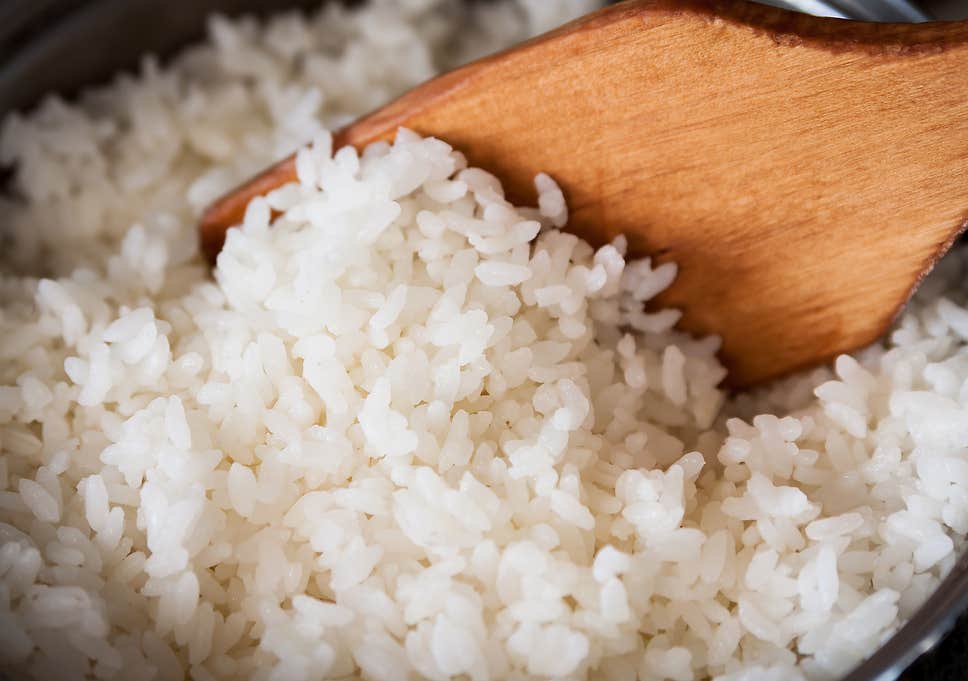Cooked rice can make you sick if you don’t store it like this

An illustration of a skull and cross bone next to a bowl of rice photographed from above.
There are bacteria that can be present as spores in rice packets and spice containers.
When it comes to food poisoning, most of us know the dangers of undercooked chicken or seafood left out of the fridge for too long, but did you know rice can also leave you with more than a full belly?
You can get food poisoning from rice if you don’t store it in the fridge soon enough after cooking.
What makes you sick is Bacillus cereus, says CSIRO food microbiologist Cathy Moir.
Bacillus cereus
Bacillus cereus under the microscope.
These bacteria produce toxins that will give you a (usually) mild vomiting illness shortly after you eat the contaminated food (sometimes it only takes 30 minutes to get sick).
Bacillus cereus is commonly found in soil and sometimes in plant foods that are grown close to the ground, such as rice, legumes, cereals, spices, etc.
If foods are cooked and handled correctly Bacillus cereus isn’t a problem.
The trouble is that in dry conditions — such as those found in a rice packet or spice container — Bacillus cereus remains present as spores.
Cooking not enough to kill spores or toxins
The spores stay dormant until you add water then presto, they germinate and grow.
Unfortunately, the cooking process doesn’t kill the heat-resistant spores or the toxin the bacteria produces.
Cooking with rice
A bowl of rice seasoned with sesame seeds.
When it comes to cooking rice, there are plenty of decisions to be made.
Once the rice is cooked, the Bacillus cereus bacteria grow and thrive in the moist, warm environment, especially when other bacteria that may have been present initially have been killed by cooking.
So if you’re not going to eat rice straight after you’ve cooked it, you need to store it in the fridge — preferably within an hour or so, but definitely within four hours.
Refrigeration won’t kill the bacteria but it will slow down their growth.
For this reason, any uneaten leftover rice should be thrown out after five days in the fridge.
Any longer and you risk having enough of the food poisoning bacteria present to make you sick.
No more dodgy fried rice
Ms Moir says this type of food poisoning is less frequent now than it was in the 1970s, when fried rice was a common culprit.
What happens to your body when food poisoning takes hold?
A woman with her head over the toilet bowl looking sick
A study sheds some new light on this, and could lead to better treatment for severe symptoms.
“Restaurants would cook steamed rice one day, then leave the rice out overnight to cook as fried rice the next day,” she explains.
“So it had been sitting around for a day and the Bacillus spores had germinated, grown, and produced the toxins.
“When the fried rice was cooked, the toxin wasn’t destroyed; then the customer consumed the rice and was sick, so there were plenty of outbreaks.
“With the health authorities identifying the cause and educating the restaurateurs, the incidence of this type of food poisoning quickly decreased.”
The best way to avoid food poisoning from Bacillus cereus and other, often nastier, bacteria is to always cook and store food safely.
Like what you’re reading? Sign up for the ABC Life newsletter to see more
Cooking rice for later
If you are cooking rice that is not going to be eaten straight away, Ms Moir suggests waiting until the steam stops rising, then cover the rice and put it in the fridge.
Crispy rice salad
Two bowls of crispy rice salad topped with crispy tofu strips and rainbow greens, with microgreens nearby. A vegetarian meal.
A dish to impress your friends and give you a positive deep-frying experience.
Cooked rice can make you sick if you don’t store it like this
An illustration of a skull and cross bone next to a bowl of rice photographed from above.
There are bacteria that can be present as spores in rice packets and spice containers.
When it comes to food poisoning, most of us know the dangers of undercooked chicken or seafood left out of the fridge for too long, but did you know rice can also leave you with more than a full belly?
You can get food poisoning from rice if you don’t store it in the fridge soon enough after cooking.
What makes you sick is Bacillus cereus, says CSIRO food microbiologist Cathy Moir.
Bacillus cereus
Bacillus cereus under the microscope.
These bacteria produce toxins that will give you a (usually) mild vomiting illness shortly after you eat the contaminated food (sometimes it only takes 30 minutes to get sick).
Bacillus cereus is commonly found in soil and sometimes in plant foods that are grown close to the ground, such as rice, legumes, cereals, spices, etc.
If foods are cooked and handled correctly Bacillus cereus isn’t a problem.
The trouble is that in dry conditions — such as those found in a rice packet or spice container — Bacillus cereus remains present as spores.
Cooking not enough to kill spores or toxins
The spores stay dormant until you add water then presto, they germinate and grow.
Unfortunately, the cooking process doesn’t kill the heat-resistant spores or the toxin the bacteria produces.
Cooking with rice
A bowl of rice seasoned with sesame seeds.
When it comes to cooking rice, there are plenty of decisions to be made.
Once the rice is cooked, the Bacillus cereus bacteria grow and thrive in the moist, warm environment, especially when other bacteria that may have been present initially have been killed by cooking.
So if you’re not going to eat rice straight after you’ve cooked it, you need to store it in the fridge — preferably within an hour or so, but definitely within four hours.
Refrigeration won’t kill the bacteria but it will slow down their growth.
For this reason, any uneaten leftover rice should be thrown out after five days in the fridge.
Any longer and you risk having enough of the food poisoning bacteria present to make you sick.
No more dodgy fried rice
Ms Moir says this type of food poisoning is less frequent now than it was in the 1970s, when fried rice was a common culprit.
What happens to your body when food poisoning takes hold?
A woman with her head over the toilet bowl looking sick
A study sheds some new light on this, and could lead to better treatment for severe symptoms.
“Restaurants would cook steamed rice one day, then leave the rice out overnight to cook as fried rice the next day,” she explains.
“So it had been sitting around for a day and the Bacillus spores had germinated, grown, and produced the toxins.
“When the fried rice was cooked, the toxin wasn’t destroyed; then the customer consumed the rice and was sick, so there were plenty of outbreaks.
“With the health authorities identifying the cause and educating the restaurateurs, the incidence of this type of food poisoning quickly decreased.”
The best way to avoid food poisoning from Bacillus cereus and other, often nastier, bacteria is to always cook and store food safely.
Like what you’re reading? Sign up for the ABC Life newsletter to see more
Cooking rice for later
If you are cooking rice that is not going to be eaten straight away, Ms Moir suggests waiting until the steam stops rising, then cover the rice and put it in the fridge.
Crispy rice salad
Two bowls of crispy rice salad topped with crispy tofu strips and rainbow greens, with microgreens nearby. A vegetarian meal.
A dish to impress your friends and give you a positive deep-frying experience.
This helps it stay out of the food temperature danger zone — 5 to 60 degrees Celsius — as soon as possible.
Large portions of hot rice cool faster when put into shallow trays less than 10cm deep but do not stack the containers until the rice is cool, Ms Moir advises.
To minimise the impact of hot rice on the temperature inside your fridge, put frozen ice bricks on top of the containers while they cool.
This is general information only. For detailed personal advice, you should see a qualified medical practitioner who knows your medical history.




